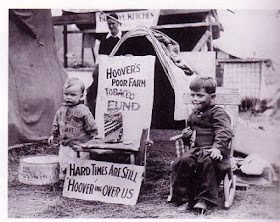If you had money in a bank, all of your savings were gone, because banks could no longer pay account holders. When there is no money in savings banks, loans can not be made for homes and businesses. The economy can not grow and people lose jobs. At this time, banks did not insure deposits. Homes were subsequently lost and farmers suffered, plunging many Americans into abject poverty. If you did not have a job, how could you pay for food, your medicine, your clothing, etc? America was in dire straights, and the entire psyche of the country was demoralized.
Soup kitchen during the Great Depression
Source:casoupkitchen
The homeless and poor did not have safety nets such as welfare, food stamps, or unemployment benefits like today. Some people lived in camps called "Hoovervilles", camps set up for the homeless. Herbert Hoover was President at the time and he believed in the "Trickle Down Theory". The Trickle Down Theory meant that the very wealthy would stimulate the economy and the rest would "trickle down to the poor". Sadly, the American economy would take many, many years to recover.
Hooverville: American Shanty towns
Source: Project World Awareness
I sometimes look at stark photographs of residents from Appalachia, barefoot and dirty. I study the furrowed brows of African Americans in the rural South, who already had it bad because of social policies and no jobs. Folks sold apples on corners, pencils, odd jobs, and yes even begging, doing whatever they could do to survive.
***
If you ever had the pleasure of knowing someone who had lived during these times, you would be amused at their beliefs and how they view money. For example, my dad always insisted in having a refrigerator that was full. He never likes to see an empty refrigerator. His generation always believed in saving for a rainy day. Lights off when not in use. Short showers and limited clothes washing in hot water. Many decades later, I once poured ketchup on a hamburger. Instead of waiting in "anticipation", like the old Heinz Ketchup Commercial, the ketchup flew out, a bland mixed concoction of tomato sauce. Dad struck often, stretching food, and cleaning supplies.
When it was time to pay bills, I learned real early to disappear. ESPECIALLY during the cold winter months in Connecticut, because our house required expensive heating oil. For most of my family's life, we were considered a working middle class family. Dad was a long time factory foreman, and sometimes worked overtime and Saturdays. He surprised me with an upright piano, and I would get money for shopping trips. In junior high, both my brother and I went on week long school field trips to Cape Cod and Washington, D.C. School lunches were paid in cash, not free or reduced tokens. Every two weeks I traveled to Downtown Hartford, to Soul Scissors, the once popular hair salon chain that catered to African American Hair. Soul Scissors were always located in an upscale department store, complete with continuous disco music and attractive stylists that swore by Revlon Relaxers. Best believe I earned all of these rewards through chores, grades and behavior.
Former Nationwide upscale beauty salon
Source: Trademarkia.com
And then a recession occurred, and Dad no longer worked in the factory......
Fast forward to June, 2012. I was watching of the large contingency of Montford Point Marines who hailed from Detroit, The Motor City, triumphantly boarding their plane after the Congressional Medal of Honor Activities. I was wondering how many of them achieved the American Middle Class Dream and were employed at Ford, General Motors or Chrysler? I watched these elderly man as they chatted animatedly, trading long stories with their sharp Montford Point Marine Association hats, with " Detroit" stitched on the side in white. How many of them raised children, grand-children, put kids through school, taught school, and prospered in successful careers? Many are / were definitely leaders in their community, because, face it, Montford Point Marines had presence.
Source: croweautos.com
I listen to people today bemoan the current Recession, (the worst recession since the Great Depression) with their smart phones, cable, expensive shoes and complain about this or that. When I catch myself complaining and commiserating I stop myself. I think about others less fortunate. I am thankful for the people who truly care about me and have my best interests at heart. For it could be considerably worse.
This sign says it all.
Source: Businessweek.com





No comments:
Post a Comment